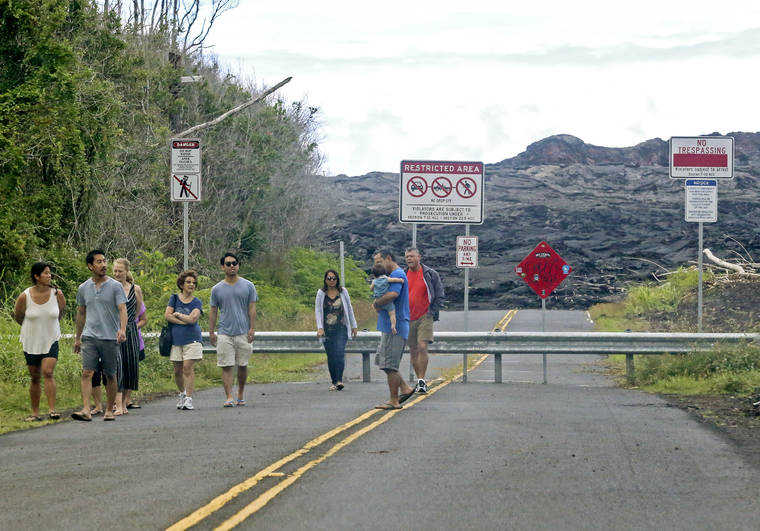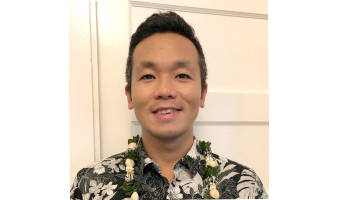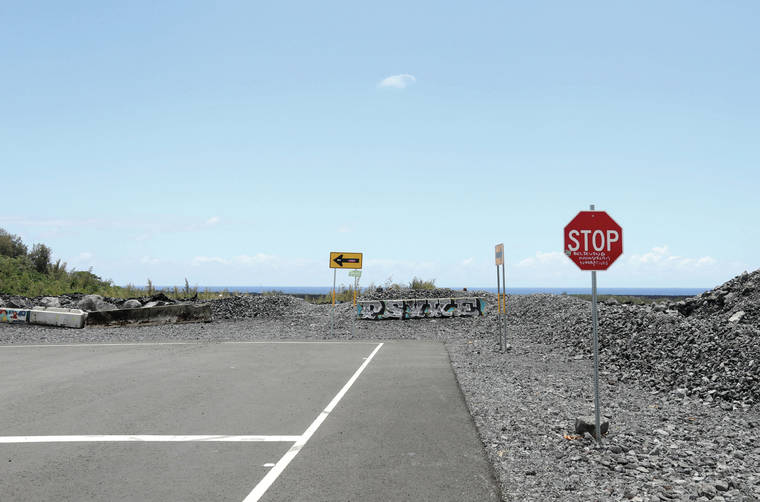The Hawaii County Kilauea Recovery Task Force confirmed Tuesday that it will restore several more roads in lower Puna that were buried by lava during the 2018 Kilauea eruption.
During a meeting of the County Council’s Committee on Governmental Relations and Economic Development, County Recovery Officer Doug Le announced that the county will clear three more sections of road in lower Puna, in addition to the upcoming project to reopen Pohoiki Road.
Those sections include:
• Leilani Avenue from Pohoiki to Kahukai Street.
• 900 feet of Lighthouse Road, along with a plan for public access at Kumukahi.
• A stretch of Highway 137 from the Highway 132/Lighthouse Road intersection to Kapoho Vacationland.
In addition, the temporary road to Isaac Hale Beach Park on Highway 137 will be restored to permanent standards.
Le said the Kilauea Recovery Task Force came to the decision to restore those roads after consideration of several factors, including extensive discussions with community members.
The announcement is a boon to lower Puna residents who have been unable to permanently return to their properties for two years without a maintained or repaired road.
“Finally!” said Debra Smith, president of the Vacationland Hawaii Community Association board. “We’ve been in limbo for so long.”
Smith told the Tribune-Herald she is one of three homeowners whose Vacationland home survived the eruption and remains largely unharmed but inaccessible in a kipuka. The homeowners, with other area property owners, worked with the county for more than a year to determine how to reopen Lighthouse Road while protecting local burial sites.
While Smith said she thinks Highway 137 should be opened all the way to Pohoiki Road for emergency access purposes, reopening it to Kapoho Kai Drive will allow Kapoho residents to begin to clear the roads in the destroyed subdivision.
Kapoho property owner Eric Cockroft said the rehabilitated roads will allow Puna to recover economically from the 2018 disaster.
“It’s going to be great to be able to drive home again,” Cockroft said. “We’ve seen, with Highway 132, how quickly people go back to their land. You already see people with bulldozers out there rebuilding. I’m looking forward to seeing orchid farming start up again. It’s going to be a great economic driver for Puna.”
Smith and Cockroft both said the news is a ray of hope for a community that has spent more than two years unsure of whether they will ever be able to return home.
“It’s changed the whole aura of everything for me,” Cockroft said. “Before it was starting to feel like death was right over my shoulder, but now I feel like there’s something to live for.”
Cockroft urged the county to develop a timeline for reopening the roads as quickly as possible, but added that he sees no reason the Highway 137 reopening can’t be done within three months.
However, Le said no timeline for the road reopenings has been determined, as each project will require substantial prep work and assessments from the Federal Emergency Management Agency, which in March identified about $82 million in damage to public roads by the Kilauea eruption. FEMA entered an agreement with the county to cover 75% of that sum, or about $61.5 million.
Preparations for the Pohoiki reopening project are complete on the county side, Le said, but still need a final notice to proceed from FEMA. Le said it is unclear whether FEMA’s activities have been delayed by the ongoing COVID-19 pandemic.
Le also announced that the county will not restore Hinalo, Lauone and Honua‘ula streets in Lanipuna Gardens. Funding for roads that will not be reopened will be applied to other recovery projects in Puna.
The recovery team also is discussing with FEMA the total damage to the county by the loss of resources such as Isaac Hale Beach Park and Ahalanui Park, saying that sum is currently estimated to be somewhere in the “single-digit millions” range.
Email Michael Brestovansky at mbrestovansky@hawaiitribune-herald.com.










